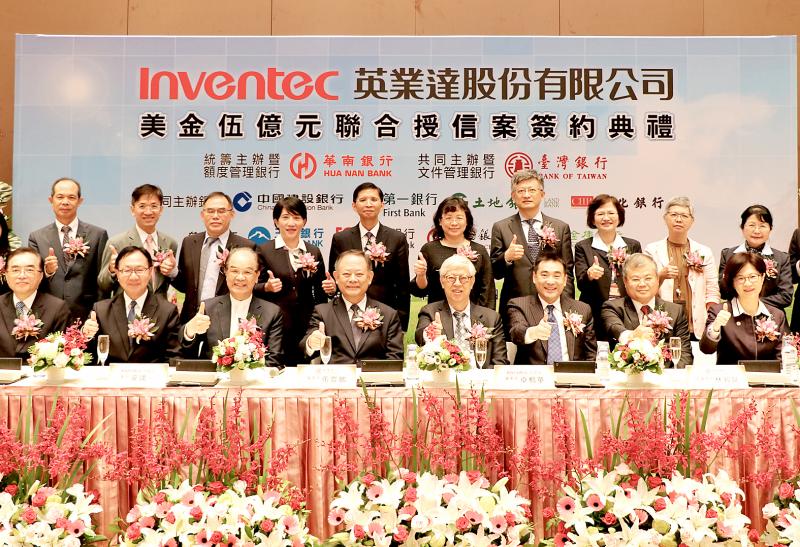State-run Hua Nan Commercial Bank (華南銀行) yesterday inked a deal to grant local notebook maker Inventec Corp (英業達) a syndicated loan of US$500 million to bolster its operations.
Hua Nan Bank chairman Derek Chang (張雲鵬) signed the pact with Inventec chairman Tom Cho (卓桐華), the bank said.
The banking arm of Hua Nan Financial Holding Co (華南金控) is aiming to deepen its share of the syndicated loan market after it ranked third among local lenders in syndicated loan value in the first half of this year.

Photo courtesy of Hua Nan Commercial Bank
The agreement was in line with Hua Nan Bank’s effort to support local companies and advance the government’s policy that state-run banks provide NT$1 trillion (US$34.54 billion) of loans to companies in six strategic industries to help them link up with the world, transform and upgrade, Chang said.
As of Friday last week, the bank had approved NT$42.5 billion of corporate loans to support companies returning from China and stimulus programs, it said.
Inventec mainly manufactures and markets computers and electronic products.
To maintain its competitive advantage, the company also invests in artificial intelligence, 5G, Internet of Things and other advanced technology applications, Hua Nan Bank said.
The syndicated loan was joined by 12 other lenders, including First Commercial Bank (第一銀行), Taiwan Cooperative Bank (合作金庫), Mega International Commercial Bank (兆豐銀行), E.Sun Commercial Bank (玉山銀行), Land Bank of Taiwan (土地銀行) and Chang Hwa Commercial Bank (彰化銀行).

Zhang Yazhou was sitting in the passenger seat of her Tesla Model 3 when she said she heard her father’s panicked voice: The brakes do not work. Approaching a red light, her father swerved around two cars before plowing into a sport utility vehicle and a sedan, and crashing into a large concrete barrier. Stunned, Zhang gazed at the deflating airbag in front of her. She could never have imagined what was to come: Tesla Inc sued her for defamation for complaining publicly about the vehicles brakes — and won. A Chinese court ordered Zhang to pay more than US$23,000 in

Taiwan Semiconductor Manufacturing Co (TSMC, 台積電) yesterday held its first board of directors meeting in the US, at which it did not unveil any new US investments despite mounting tariff threats from US President Donald Trump. Trump has threatened to impose 100 percent tariffs on Taiwan-made chips, prompting market speculation that TSMC might consider boosting its chip capacity in the US or ramping up production of advanced chips such as those using a 2-nanometer technology process at its Arizona fabs ahead of schedule. Speculation also swirled that the chipmaker might consider building its own advanced packaging capacity in the US as part

Taiwan Semiconductor Manufacturing Co (TSMC, 台積電) yesterday said that its investment plan in Arizona is going according to schedule, following a local media report claiming that the company is planning to break ground on its third wafer fab in the US in June. In a statement, TSMC said it does not comment on market speculation, but that its investments in Arizona are proceeding well. TSMC is investing more than US$65 billion in Arizona to build three advanced wafer fabs. The first one has started production using the 4-nanometer (nm) process, while the second one would start mass production using the

US President Donald Trump has threatened to impose up to 100 percent tariffs on Taiwan’s semiconductor exports to the US to encourage chip manufacturers to move their production facilities to the US, but experts are questioning his strategy, warning it could harm industries on both sides. “I’m very confused and surprised that the Trump administration would try and do this,” Bob O’Donnell, chief analyst and founder of TECHnalysis Research in California, said in an interview with the Central News Agency on Wednesday. “It seems to reflect the fact that they don’t understand how the semiconductor industry really works,” O’Donnell said. Economic sanctions would